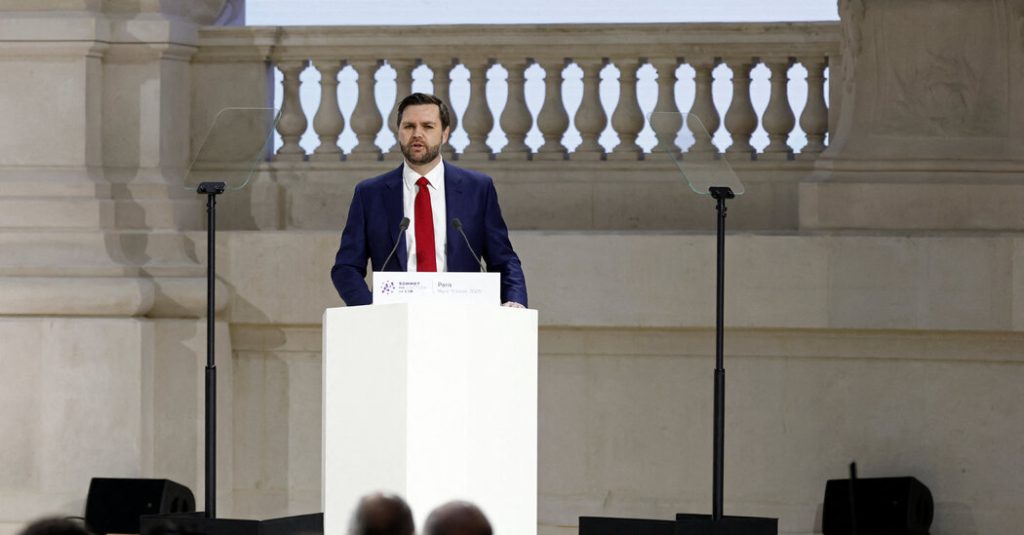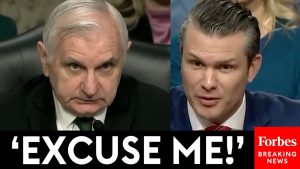Vice President JD Vance told European and Asian leaders in Paris on Tuesday that the Trump Administration was adapting an aggressive, America First approach to the race to dominate all the building blocks of artificial intelligence, and warned Europeans to dismantle regulations and get aboard with Washington.
On his first foreign trip since taking office, Mr. Vance used his opening address at an A.I. summit meeting hosted by France and India to describe his vision of a coming era of American technological domination. Europe, he said, would be forced to chose between using American-designed and manufactured technology or siding with authoritarian competitors — a not-very-veiled reference to China — who would exploit the technology to their detriment.
“The Trump administration will ensure that the most powerful A.I. systems are built in the U.S. with American design and manufactured chips,” he said, quickly adding that “just because we are the leader doesn’t mean we want to or need to go it alone.”
But he said that for Europe to become what he clearly envisions as a junior partner, it must eliminate much of its digital regulatory structure — and much of its policing of the internet for what its governments define as disinformation.
For Mr. Vance, who is on a weeklong tour that will take him next to the Munich Security Conference, Europe’s premier meeting of leaders, foreign and defense ministers and others, the speech was clearly intended as a warning shot. It largely silenced the hall in a wing of the Grand Palais in the center of Paris. Leaders accustomed to talking about “guardrails” for emerging artificial intelligence applications and “equity” to assure the technology is available and comfortable for underserved populations heard none of those phrases from Mr. Vance.
He spoke only hours after President Trump put new 25 percent tariffs on foreign steel, essentially negating trade agreements with Europe and other regions. Mr. Vance’s speech, precisely composed and delivered with emphasis, seemed an indicator of the tone Mr. Trump’s national security leaders plan to take to Europe this week.
Defense Secretary Pete Hegseth will be talking about Ukraine with European leaders on Wednesday, and Secretary of State Marco Rubio arrives in Munich when the conference opens at the end of the week. That session is likely to be dominated by competing American and European views on how to negotiate an end to the war in Ukraine.
With a brief background in Silicon Valley and venture capital, Mr. Vance is the image of a new generation of Republicans soaked in Mr. Trump’s America First ideology. After Mr. Vance left the hall, not staying to hear the European response, the United States and Britain declined to sign the summit’s communiqué.
Mr. Vance started off his speech with a direct reference to the A.I. Safety Summit, held at Bletchley Park, the grand estate in Britain where code-breakers cracked the German Enigma codes in World War II. That conference ended with a dire warning of “serious, even catastrophic harm, either deliberate or unintentional, stemming from the most significant capabilities of these A.I. models.” Twenty-eight nations, including the U.S., vowed to “work together in an inclusive manner to ensure human-centric, trustworthy and responsible A.I.”
Mr. Vance went out of his way to separate himself from that summit and the speech given by his predecessor, Kamala Harris. “I’m not here this morning to talk about A.I. safety,” he said. “I’m hear to talk about A.I. opportunities,” warning that America’s response to the challenge of A.I. could no longer be “self-conscious” or “risk averse.”
“The A.I. future is not going to be won by hand-wringing about safety,” he said.
At a moment that Mr. Trump is disbanding government boards and units that were hunting down disinformation, much of it from Russia, China and Iran, Mr. Vance made the case that American technology firms were still dealing with “massive regulations” in Europe.
He did not propose scrapping all such rules but said, “It is one thing to prevent a predator from preying on a child on the internet, and it is something quite different to prevent a grown man or woman from accessing opinions that the government thinks is misinformation.”
Of course in Washington, that is exactly what many federal employees charge Mr. Trump is doing, as he orders all references to D.E.I. — diversity, equity and inclusion — stripped from government websites, and has banned government employees from putting their preferred personal pronouns in their signatures.
At the same time Mr. Vance warned about how “hostile foreign adversaries have weaponized A.I. software to rewrite history, surveillance users and censor speech.” But he did not explain how to monitor or remedy that issue.
European officials knew roughly what was coming, even if they did not know Mr. Vance would be so blunt. In the opening day of the conference, France’s president, Emmanuel Macron, spoke of a need to simplify European regulation. He has announced over $100 billion in private investment in France on AI technologies, and the power to generate them. That is a huge figure for France, but a fraction of what the private sector is spending in the United States, and what China and its state-owned firms, and startups, are committing.
Mr. Vance got to the heart of a central dispute that is likely to widen in the coming year: The European Union regulates tech companies much more forcefully than the United States.
The bloc’s Digital Services Act, passed in 2022, aims to combat misinformation and force social media companies to more aggressively police and moderate their platforms for illicit content — or risk billions of dollars in fines. The Digital Markets Act, also passed in 2022, gives European regulators wide authority to force the largest online gatekeepers to change their business practices, to prevent tech giants from boxing in users and to foster more competition.
Europe has also sought to be at the forefront of regulating A.I. by pushing to raise the level of oversight and attempting to limit the use of the technology. But with the United States and China racing ahead in A.I. development, Mr. Macron has urged Europe to ease up and prioritize innovation over regulation.
Regulators in Brussels have targeted U.S. tech companies with multiple investigations and fines. Apple and Google have faced billions in fines over issues like unpaid taxes and preferential treatment in search results. Meta has been accused of violating European competition rules and of having insufficient safeguards to counter election disinformation. Last month, regulators opened an investigation into X over the spread of illicit content.
The United States has argued that Europe’s approach unfairly targets American tech titans. Mark Zuckerberg, the head of Meta, called on Mr. Trump to defend U.S. tech companies from what he called European “censorship,” and to demand that the European Union stop fining them.
“We’re going to work with President Trump to push back on governments around the world that are going against American businesses,” Mr. Zuckerberg said last month, shortly after he announced that Meta would end its fact-checking program.
Ursula von der Leyen, the president of the European Commission, who spoke on Tuesday right after Mr. Vance, did not forcefully confront her predecessor — who had already left the room. Echoing Mr. Macron, she herself acknowledged that “we have to make it easier, and we have to cut red tape, and we will.”
“Too often I hear that Europe is late to the race, that the United States and China have already gotten ahead,” she said. “I disagree. The A.I. race is far from being over.” Ms. von der Leyen said Europe aimed to invest $200 billion in A.I in the coming years.
But she also defended the European Union’s regulatory approach and suggested there was a “distinct European brand of A.I.” that focused on “complex applications,” that was cooperative, and that embraced an open-source approach, meaning the underlying software is widely shared.
“Yes, A.I. needs competition,” she said. “But A.I. also needs collaboration. And A.I. needs the confidence of the people, and has to be safe.”
Liz Alderman and Aurelien Breeden contributed reporting from the A.I. summit in Paris.








